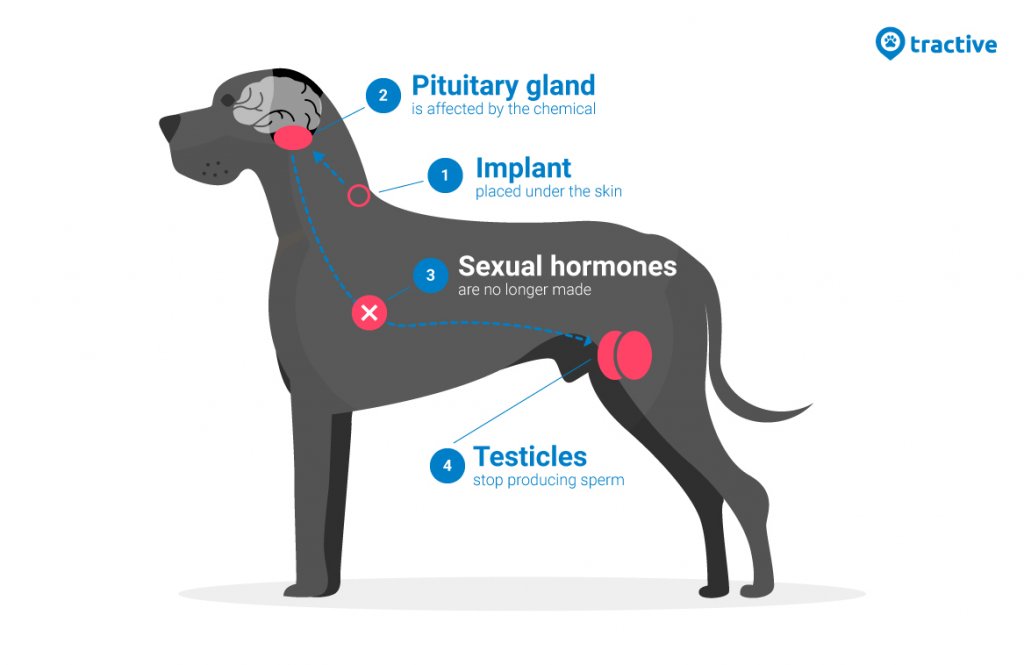Considering castrating or neutering your male dog? Surgical castration is not the only option. You could also look into chemical castration, also known as a Suprelorin implant. Unlike surgery with permanent effects, this means your dog can be temporarily castrated with a small chemical injection. Learn more about Suprelorin, the dog castration implant, and see if this is the right option for your buddy. When you’re done, check out other helpful guides for dog parents on the Tractive blog.
There are several reasons why dog parents choose to castrate (neuter) their male dogs. Left uncastrated, male dogs produce both sperm and testosterone, which can have some undesired or unplanned consequences. These include:
Dog parents who want to castrate their male dog(s) to prevent these issues have two options: surgical or chemical castration.
Chemical castration for dogs is a temporary castration option which is carried out using a Suprelorin implant. Your vet can implant this under your dog’s skin in a process similar to microchipping. It is relatively painless, and unlike surgical castration, does not require anesthesia. You can think of the implant as a tiny pill – it’s just taken “by skin” instead of by swallowing. Once in there, the Suprelorin implant will slowly release Deslorelin over time – this is the active ingredient that suppresses the function of the pituitary gonadal axis. In normal English, that’s the part of the brain which controls the reproductive system. As long as Deslorelin is present and released in your dog’s body, your dog will stay infertile.
The following infographic explains how chemical castration in dogs works:

According to the implant manufacturer’s website, Suprelorin takes more than a month to show its effects the first time it is implanted. So be sure to keep your male dog away from female dogs in heat during this time to avoid unwanted pregnancies.
Once the Suprelorin implant has become effective (over one month after injection), it lasts for 6 months; once the active ingredient (Deslorelin) is completely absorbed by the body, the implant will lose its effects. That’s why it’s recommended to implant again every 6 months to ensure continued infertility in your dog. Alternatively, you may choose to opt for surgical castration later on.
No. After the castration implant has lost its effectiveness, it does not need to be removed again. It will break down completely in your dog’s body without harming them. It should dissolve completely after about twice the time the implant was active. So, if it was active for 6 months, it will be gone by 12 months.
Chemical dog castration will only affect those behaviors in your dog which are driven by the male sex hormones. Once the implant has taken effect, your dog may:
However, as VCA Hospitals notes, “A dog’s temperament, training, personality, and ability to “work” are a result of genetics and conditioning, not sex hormones.” So castration is not a substitute for training. You will still need to teach your dog basic obedience commands. For example, how to walk with you on a leash, or not to beg or steal food from the table!
Have a dog with a strong mating or prey drive, or a tendency to roam too far? Get yourself a Tractive GPS tracker so you can enjoy peace of mind, and always know where your dog is.
Along with the intended effects such as lower testosterone, decreased libido, less sperm production, and temporary infertility, you can also expect the following possible side effects of Suprelorin in dogs:
Suprelorin is approved by the Committee for Medicinal Products for Veterinary Use. They have concluded that the benefits of the implant outweigh the risks of negative side effects.2
After castration, dogs typically need to consume less calories, since their activity level will likely decrease. If you’re not careful, your castrated male dog may gain weight. To ensure that your dog is getting enough physical activity after castration, invest in a GPS tracker and activity monitor for dogs. With it, you can keep track of how active they’ve been, see if they’ve got enough rest, and track calories burned. You can even set daily goals for them!
To summarize, the chemical castration option has its advantages and disadvantages. Here are the pros and cons of the Suprelorin dog castration option:
| Pros | Cons |
| – Temporary/reversible – Low cost – No serious intervention – No anesthesia necessary – Significantly reduced unwanted sexual behavior |
– Permanent hormonal changes – Changes in coat can occur – Adverse side effects possible |
In addition, studies have found that castrated dogs live, on average, 14% longer than uncastrated dogs3.
The chemical castration option is a good choice for dog parents who:
Since the implant is temporary, it’s a good way to check the effects of castration on